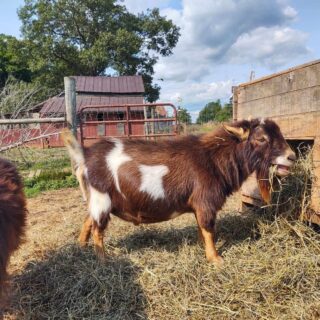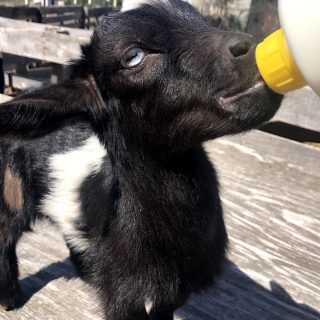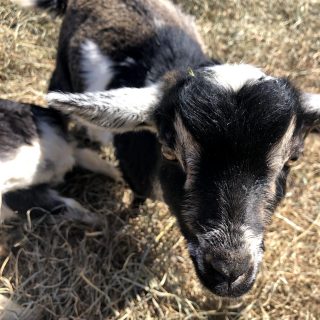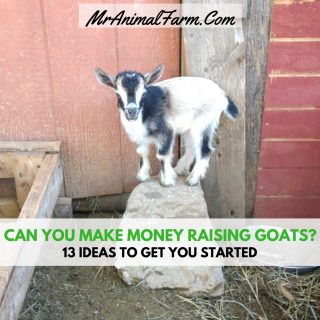Raising goats can be such a fun and rewarding experience. I mean, other than the fact that they are adorable jumping machines. They are also intelligent and personable animals that can serve many different purposes on your homestead.
If you are interested in raising goats, it is important for you to understand their basic needs for shelter, pasture and general supplies. You should also understand what you want them for (pets, show, milk, meat etc) and be aware of their potential health issues. Additionally, you will want to know how much they will cost you to care for.
When I first decided I wanted goats (because, well, they are SO cute!), I didn't really know all the ways they might help out around the homestead. As I did my research, I realized that getting goats might be more beneficial than just a new source of animal love 🙂 However, there are also a lot of things you need to know about them so that you can keep a happy and healthy herd.
Raising Goats
If you want to be successful with your goat herd, then it is important to understand what your goats will need to stay healthy. You should also assess why you want goats so that you can make the right goat purchase decisions.
Before you get started, make sure that you fully understand common goat terminology as that will make it a lot easier to understand what your goats need.
When you know how to take care of your goats and you have purchased the right goats for your needs, wants and situation, then you will have a thriving herd that is very rewarding.
What are Goats Good for?
There are a variety of different things that goats can be used for. Though some goat breeds will be better suited for some things than others.
In general, goats are owned for one (or a few) of the following six reasons: Pets, Milk, Meat, Show, Hair, Brush Clearing.
Pets
Many, many people have goats as pets - as their only reason or alongside one of the other things goats are used for. Goats are intelligent and also are attached to their owners. Although some goats are friendlier than others. They do make excellent pets.
Often times, goats will come over to be pet or just get attention in general from their humans. They have their own individual personalities as well.
Milk
If you have dairy goats, then you will be able to get milk from them. Learning how to milk goats is relatively easy and though you won't get as much as a cow gives they do produce well. Especially larger breeds like Saanens.
You can of course use the milk yourself, either raw or pasteurize the milk. But you can also use the milk to feed to your other homestead animals or to make value added products such as goats milk soap. It is a good way to really use everything on your homestead.
Meat
If you have meat goats, then they are (pretty obviously) used for meat products. Breeds such as Boers are very large and produce a good amount of meat for consumption.
Show
Goats can be taught to lead on a collar and leash. And, many people like to show their goats in 4h and also in other goat shows.
Hair
If you have a hair breed like a Cashmere goat, then you can sheer them and used their hair/fiber for value added products like making clothing.
Brush Clearing
Goats love to eat and they are foragers more than grazers. This means that although they will eat grass in a flat pasture, they much prefer to eat brush, trees, leaves and other types of browse.
Due to this, they are often used to clear brush since they can plow through thorns and vines and thick foliage quite quickly and easily.
Need some help to keep your goats healthy and maintained? The G.O.A.T Herd Management Binder has you covered from supplies to routine care reminders.
How to Buy a Goat
The first and most important thing you need to know about buying a goat is that (like Pringle's) you can't have just one. Goats are herd animals and a single goat will get very lonely. They can actually get sick from being lonely.
When you are deciding what goat to get, you should decide what you are getting your goats for so that you can easily decide what goat breed will be best for you.
One other thing to consider is what sex goat(s) to get. It is important to note that bucks and does should not really be kept together at all times as they can breed constantly that way. So, if you are just starting your herd, you should start with two does, a doe and a wether (fixed male), two wethers. Or, if you have separate areas for them you can do any of those combinations together and add two bucks or a buck and weather in another area.
Goat Supplies
Goats don't need a whole ton of supplies. However, there will be some one time start up things you need for your herd and then some regular every day supplies to have on hand.
In addition to your basic care supplies below, you may also consider getting some goat toys to keep your herd entertained.
Shelter
Goats hate to get wet. They also need some protection from predators and other weather conditions like wind, snow and heat.
There are a large variety of goat pens or shelters that you can use for your herd. The space your goats need will depend on their breed (size) and also how much time they will spend in the shelter Generally, they need anywhere from 10 - 20 sq feet of space per goat in their shelter.
Pasture & Fencing
Goats will also need some outdoor space. It is important to use proper goat fencing so that it holds your goats in and they don't escape.
The more outside space they have the better. It will help keep down on health issues such as worms and will also help cut down on feed costs the more browse they have access to.
It is also important to ensure that there aren't any poisonous plants in their pasture area for them to get into.
General Goat Supplies
In addition to shelter and pasture, you'll need some general goat supplies for the daily care of your goats. Things like hay feeders, waterers, hoof trimmers.
As your herd grows and you have had your goats for a longer time, your list of supplies will probably keep increasing. However, you don't really need too much when you are just getting started for the bare essentials.
Breed Specific Supplies
You will also need some supplies that are specific to whatever breed you have chosen. For example, if you have dairy goats, you will need to get milking supplies. If you have fiber goats you will need supplies to sheer them.
Medical Supplies
You will also need medical supplies for you goats. Some basic ones that are good to have on hand are:
- Needles and Syringes
- Antibiotic (such as LA-200)
- Dewormers
- Copper Bolus
- Probiotics
- Albon or other Coccidiosis treatment
- BOSE
Feeding Goats
As mentioned earlier, goats are foragers not grazers. So, they much prefer brush, vines, bushes, leaves and the like to eat during the day. But, of course, they will eat grass on pasture if that's what you have to offer.
You will also need to offer them feed regularly as they are unlikely to get everything they need without you giving them food also.
Hay and Chaffhaye
They need a high quality hay to eat free choice (available at all times). Grass hay such as orchard or alfalfa is a good choice.
You can also offer a product like Chaffhaye which is a good hay substitute.
Baking Soda & Minerals
Your goats will also need free choice (always available) baking soda and minerals. The baking soda is something they will eat when they need it - it helps prevent bloating issues.
The minerals should be goat specific and should be a loose mineral not a mineral block. They will also eat those as they need them.
Grain and treats
Feeding your goats grain and other treats is not a necessity. It is important to know what goats eat as there are some treats that are not good for them.
It is OK to give your goats grain or other treats in moderation, but be aware that too much of either can cause severe health issues like bloat. But as a daily treat, or for goats who need to add a little body weight it is totally fine to do in moderation.
Cost to feed
The cost to feed your goats will vary drastically based on your cost of hay, how much hay your goats needs (more browse will be less hay consumption) and whether or not you give them additional feed.
As a VERY general idea, we spend about $250 on feed per goat per year. We have smaller Nigerian Dwarf goats and our hay costs about $7 per bale.
General Cost of Goats
The cost of raising goats can vary much like the cost to feed them.
Your initial goat purchase cost will depend greatly on what type of goats you get, what sex, what quality, if they are registered and what area you are in. So, it can vary anywhere from $50 to thousands.
Just for some very general cost ideas, we spend about $350 per year on each goat. But, again, that will vary from herd to herd. So, it is a good idea to price hay in your area and vet costs as those will be your major costs. That way you can get a better, more specific estimate for your situation.
Need some help to keep your goats healthy and maintained? The G.O.A.T Herd Management Binder has you covered from supplies to routine care reminders.
Daily Goat Care
Goats don't actually take too much time when talking about their daily care. They will need fresh hay and clean water everyday. But with hay feeders, you probably won't even be filling hay every single day.
It is also important to get eyes and hands on each goat regularly to ensure they are not dealing with any health issues.
Otherwise, they will need regular hoof trimming. Milk goats will need to be milked daily when they are in milk.
Everyone should get a CDT shot annually.
And, then, during kidding season if you breed your goats, you will have additional things to do.
Goat Health Issues
Although goats can cruise along just fine most of the time, there is a whole slew of health issues that they can face. It is essential that as a goat owner, you know some of the most common health issues they can experience so that you can help keep them as healthy as possible.
Worms
Heavy worm loads may be one of the most critical and common health issues that goats can face. There are a wide variety of worms they can have: barber pole, liver fluke, tapeworms.
Barber pole is the most common and can be deadly. They cause severe anemia and can cause death if not treated properly and promptly. You should do regular Famancha Checks on your herd so that you can catch them before they are too big of an issue.
There is a lot of wormer resistance and so, you should always run a fecal (or have your vet run one) before you use chemical medications.
Coccidia
Coccidiosis is another internal parasite (like worms are). This is most common in kids, however, adults can occasionally have an issue with it also. This is something that is usually present in all fecals, but should only have a few.
The issue for coccidiosis happens when the goat has an overload of them. The best way to determine if this is the health issue is to run a fecal. Your goat may present with poor Famancha score, lethargy and/or diarrhea.
Pneumonia
Just like humans can get pneumonia (respiratory infection), goats can get this also. This is a common health issue for them especially during weather changes. So, if you have a lot of hot, cold, hot weather (or cold, hot, cold) you may want to keep an eye out for this.
Kids can also get aspiration pneumonia from inhaling birthing fluids or aspirating milk when they are bottle fed.
Fever, rapid and raspy breathing and eye and nasal discharge can all be signs of pneumonia in goats.
Bloat
If goats eat too much grain they can bloat where essentially they have a build up of gas in their rumen. This can be deadly if not addressed promptly.
Meningeal Worm
Meningeal worm is a parasitic worm that is typically carried in deer. The worm can be transmitted to goats via slugs - their mucous on pasture that is then consumed by goats.
Once ingested, the worm can then travel through the goats nerves and it lodges in their spinal cord. Once in the spinal cord it causes inflammation which can lead to issues from a slight limp to paralysis.
Listeriosis
This is a bacterial infection that is most commonly caused by eating moldy hay or feed. It can cause neurological issues such as being uncoordinated, walking in circles and paralysis of their face.
Treatment of listeriosis can be difficult, but is possible. It is essential to treat it as quickly as possible.
Breeding Goats
If you are planning to breed your goats, then you should make sure to choose the best quality buck and does you can find for your intended purposes.
Once you have made your goat breeding plans, you will need to understand how goat heat cycles work. Some breeds only go into heat in some seasons while others can breed year round.
Once, you identify the signs for how to tell your goat is pregnant, it is important to know the gestation period of goats (around 145 - 150 days) so that you know when to expect kids.
Then, you should also understand kidding signs, and know what to have in your goat birthing kit so that you are well prepared for when the kids will come.
Raising Goats For Profit
Once you have a good handle on your herd, you may be interested in seeing if you can have them at least pay for themselves. Or, perhaps, even make a profit for your homestead.
There are several revenue streams that you can use such as selling babies, selling milk, selling meat products and even goat yoga.
If you need more help keeping your goats healthy and well taken care of, check out the G.O.A.T. Herd Management System - worksheets, calculators, supply management and more to keep your goats in tip top shape while cutting down on time.




